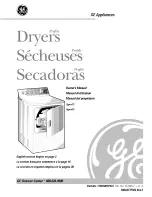
6
IMPORTANT SAFETY INSTRUCTIONS
IMPORTANT SAFETY INSTRUCTIONS
READ ALL INSTRUCTIONS BEFORE USE
WARNINg
For your safety, the information in this manual must be followed to minimize the risk of fire or explosion, electric
shock, or to prevent property damage, injury to persons, or death.
SAFETY INSTRUCTIONS FOR INSTALLATION
WARNINg
To reduce the risk of injury to persons, follow all industry recommended safety procedures including the use of long
sleeved gloves and safety glasses. Failure to follow all of the safety warnings in this manual could result in property
damage, injury to persons, or death.
Exhaust/Ducting:
Do not dry unwashed items in the tumble dryer.
– Items that have been soiled with substances such as cooking oil, acetone, alcohol, petrol, kerosene, spot removers,
turpentine, waxes and wax removers should be washed in hot water with an extra amount of detergent before
being dried in the tumble dryer.
– Items such as foam rubber (latex foam), shower caps, waterproof textiles, rubber backed articles and clothes or
pillows fitted with foam rubber pads should not be dried in the tumble dryer.
– Fabric softeners, or similar products, should be used as specified by the fabric softener instructions.
– The final part of a tumble dryer cycle occurs without heat (cool down cycle) to ensure that the items are left at a
temperature that ensures that the items will not be damaged.
WARNINg
Never stop a tumble dryer before the end of the drying cycle unless all items are quickly removed and spread out so
that the heat is dissipated.
• For appliances with ventilation openings in the base, that a carpet must not obstruct the openings.
• Exhaust air must not be discharged into a flue which is used for exhausting fumes from appliances burning gas or
other fuels.
The appliance must not be installed behind a lockable door, a sliding door or a door with a hinge on the opposite
side to that of the tumble dryer.
•
Gas dryers MUST be exhausted to the outside.
Failure to follow these instructions can result in fire or
death.
•
The dryer exhaust system must be exhausted
to the outside of the dwelling. If the dryer is not
exhausted outdoors, some fine lint and large
amounts of moisture will be expelled into the
laundry area
. An accumulation of lint in any area of
the home can create a health and fire hazard.
•
Use only rigid metal or flexible metal 4-inch (10,2
cm) diameter ductwork inside the dryer cabinet or
for exhausting to the outside. Use of plastic or other
combustible ductwork can cause a fire.
Punctured
ductwork can cause a fire if it collapses or becomes
otherwise restricted in use or during installation.
•
Ductwork is not provided with the dryer, and you
should obtain the necessary ductwork locally. The
end cap should have hinged dampers to prevent
backdraft when the dryer is not in use.
Failure to
follow these instructions can result in fire or death.
•
The exhaust duct must be 4 inches (10.2 cm) in
diameter with no obstructions. The exhaust duct
should be kept as short as possible. Make sure
to clean any old ducts before installing your new
dryer.
Failure to follow these instructions can result in
fire or death.
•
Rigid or semi-rigid metal ducting is recommended
for use between the dryer and the wall. In special
installations when it is impossible to make a
connection with the above recommendations, a UL-
listed flexible metal transition duct may be used
between the dryer and wall connection only. The
use of this ducting will affect drying time.
Failure to
follow these instructions can result in fire or death.
•
DO NOT use sheet metal screws or other fasteners
which extend into the duct that could catch lint and
reduce the efficiency of the exhaust system.
Secure
all joints with duct tape. For complete details, follow
the Installation Instructions. Failure to follow these
instructions can result in fire or death.
MFL67731084_en_160824.indd 6
2016-08-24 �� 12:16:27







































